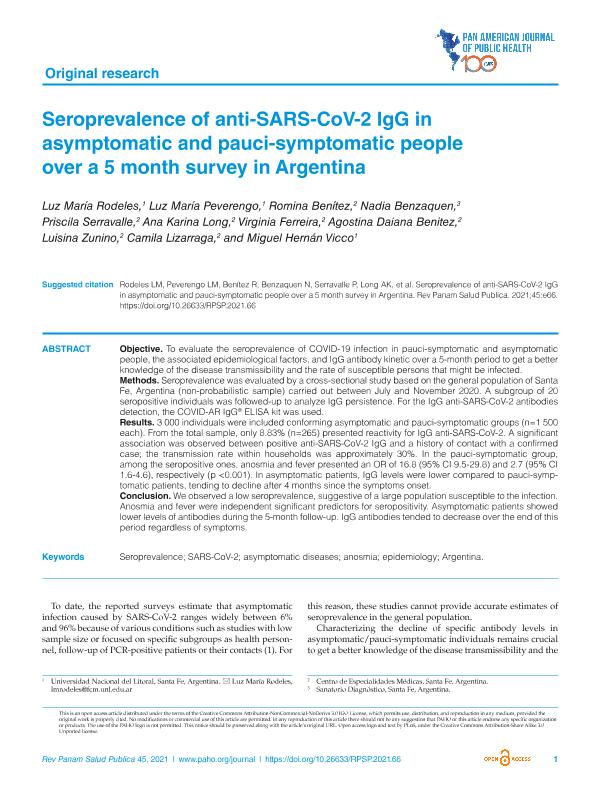Mostrar el registro sencillo del ítem
dc.contributor.author
Rodeles Antonelli, Luz María

dc.contributor.author
Peverengo, Luz María

dc.contributor.author
Benítez, Romina
dc.contributor.author
Benzaquen, Nadia
dc.contributor.author
Serravalle, Priscila
dc.contributor.author
Long, Ana Karina
dc.contributor.author
Ferreira, Virginia
dc.contributor.author
Benitez, Agostina Daiana
dc.contributor.author
Zunino, Luisina
dc.contributor.author
Lizarraga, Camila
dc.contributor.author
Vicco, Miguel Hernán

dc.date.available
2022-02-16T12:18:53Z
dc.date.issued
2021-06
dc.identifier.citation
Rodeles Antonelli, Luz María; Peverengo, Luz María; Benítez, Romina; Benzaquen, Nadia; Serravalle, Priscila; et al.; Seroprevalence of anti-SARS-CoV-2 IgG in asymptomatic and pauci-symptomatic people over a 5 month survey in Argentina; Organización Panamericana de la Salud; Revista Panamericana de Salud Pública; 45; 1; 6-2021; 1-8
dc.identifier.issn
1020-4989
dc.identifier.uri
http://hdl.handle.net/11336/152097
dc.description.abstract
Objective. To evaluate the seroprevalence of COVID-19 infection in pauci-symptomatic and asymptomatic people, the associated epidemiological factors, and IgG antibody kinetic over a 5-month period to get a better knowledge of the disease transmissibility and the rate of susceptible persons that might be infected. Methods. Seroprevalence was evaluated by a cross-sectional study based on the general population of Santa Fe, Argentina (non-probabilistic sample) carried out between July and November 2020. A subgroup of 20 seropositive individuals was followed-up to analyze IgG persistence. For the IgG anti-SARS-CoV-2 antibodies detection, the COVID-AR IgG® ELISA kit was used. Results. 3 000 individuals were included conforming asymptomatic and pauci-symptomatic groups (n=1 500 each). From the total sample, only 8.83% (n=265) presented reactivity for IgG anti-SARS-CoV-2. A significant association was observed between positive anti-SARS-CoV-2 IgG and a history of contact with a confirmed case; the transmission rate within households was approximately 30%. In the pauci-symptomatic group, among the seropositive ones, anosmia and fever presented an OR of 16.8 (95% CI 9.5-29.8) and 2.7 (95% CI 1.6-4.6), respectively (p <0.001). In asymptomatic patients, IgG levels were lower compared to pauci-symptomatic patients, tending to decline after 4 months since the symptoms onset. Conclusion. We observed a low seroprevalence, suggestive of a large population susceptible to the infection. Anosmia and fever were independent significant predictors for seropositivity. Asymptomatic patients showed lower levels of antibodies during the 5-month follow-up. IgG antibodies tended to decrease over the end of this period regardless of symptoms.
dc.format
application/pdf
dc.language.iso
eng
dc.publisher
Organización Panamericana de la Salud
dc.rights
info:eu-repo/semantics/openAccess
dc.rights.uri
https://creativecommons.org/licenses/by-nc-nd/2.5/ar/
dc.rights.uri
https://creativecommons.org/licenses/by-nc-nd/2.5/ar/
dc.subject
ANOSMIA
dc.subject
ARGENTINA
dc.subject
ASYMPTOMATIC DISEASES
dc.subject
EPIDEMIOLOGY
dc.subject
SARS-COV-2
dc.subject
SEROPREVALENCE
dc.subject
COVID-19
dc.subject.classification
Medicina Critica y de Emergencia

dc.subject.classification
Medicina Clínica

dc.subject.classification
CIENCIAS MÉDICAS Y DE LA SALUD

dc.title
Seroprevalence of anti-SARS-CoV-2 IgG in asymptomatic and pauci-symptomatic people over a 5 month survey in Argentina
dc.type
info:eu-repo/semantics/article
dc.type
info:ar-repo/semantics/artículo
dc.type
info:eu-repo/semantics/publishedVersion
dc.date.updated
2022-02-15T14:21:11Z
dc.journal.volume
45
dc.journal.number
1
dc.journal.pagination
1-8
dc.journal.pais
Argentina
dc.description.fil
Fil: Rodeles Antonelli, Luz María. Universidad Nacional del Litoral; Argentina. Consejo Nacional de Investigaciones Científicas y Técnicas. Centro Científico Tecnológico Conicet - Santa Fe; Argentina
dc.description.fil
Fil: Peverengo, Luz María. Universidad Nacional del Litoral; Argentina. Consejo Nacional de Investigaciones Científicas y Técnicas. Centro Científico Tecnológico Conicet - Santa Fe; Argentina
dc.description.fil
Fil: Benítez, Romina. Centro de Especialidades Médicas; Argentina
dc.description.fil
Fil: Benzaquen, Nadia. Servicio de Cardiología Sanatorio de Diagnóstico y Tratamiento; Argentina
dc.description.fil
Fil: Serravalle, Priscila. Centro de Especialidades Médicas; Argentina
dc.description.fil
Fil: Long, Ana Karina. Centro de Especialidades Médicas; Argentina
dc.description.fil
Fil: Ferreira, Virginia. Centro de Especialidades Médicas; Argentina
dc.description.fil
Fil: Benitez, Agostina Daiana. Centro de Especialidades Médicas; Argentina
dc.description.fil
Fil: Zunino, Luisina. Centro de Especialidades Médicas; Argentina
dc.description.fil
Fil: Lizarraga, Camila. Centro de Especialidades Médicas; Argentina
dc.description.fil
Fil: Vicco, Miguel Hernán. Universidad Nacional del Litoral; Argentina. Consejo Nacional de Investigaciones Científicas y Técnicas. Centro Científico Tecnológico Conicet - Santa Fe; Argentina
dc.journal.title
Revista Panamericana de Salud Pública

dc.relation.alternativeid
info:eu-repo/semantics/altIdentifier/doi/http://dx.doi.org/10.26633/RPSP.2021.66
Archivos asociados
